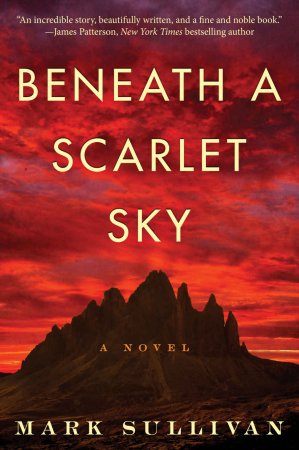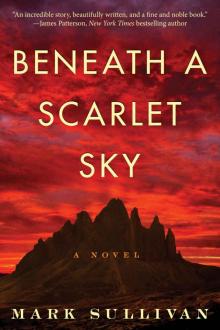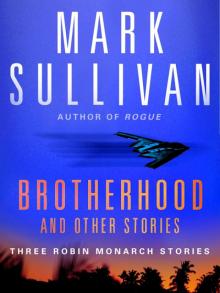- Home
- Mark Sullivan
Brotherhood and Others Page 11
Brotherhood and Others Read online
Page 11
But as they circled in for a landing, Monarch was no longer looking at the jungle fortress. He was staring far up the hillside where the vegetation had been stripped and the earth turned, as black and livid as a scabbed-over wound.
They slowed and landed. From the sound the rotors made winding down, it was a miracle they were on the ground. Thank God Monarch wasn’t planning on leaving the same way he had come in.
“Is this the only way in here?” Chatterjee asked anxiously as he unbuckled his harness and made to get out.
“Or walking through more than one hundred kilometers of bush,” Gahji said.
“Why do I get the feeling that you came in the second way?” Monarch asked.
“Because I did,” Gahji said in a boastful tone. “We all did. Even Lieutenant Zed. If you want to be one of us, you must learn to walk before you can learn to fight. The helicopter is for supplies only. And rare visitors.”
Monarch climbed out, smelling wood smoke. He could hear the jungle now: the cries of birds, the hoots of monkeys, and the thud of something heavy running through the trees. The heat was brutal, with near one hundred percent humidity, and Monarch understood he was going to have to stay hydrated, well fed, and alert if he was to complete his mission and come out of this in one piece.
More boy soldiers appeared on the ramparts to either side of the gate. Others arrived at ground level and began hauling on a rope-and-pulley system to bring the bridge across the canal.
“The bridge is kind of overkill, don’t you think?” Monarch said.
Sing agreed. “That canal isn’t that wide. Someone could get across fairly easy if they wanted.”
“If they could get past the crocs,” Gahji said as the bridge reached their side.
Whether it was the mention of crocodiles or the infernal heat, Bergenheim looked ready to faint. Chatterjee was now looking keenly at the murky canal water.
Monarch followed Gahji onto the bridge, looked down into the stinking ditch, and saw sharp prehistoric heads lying partially submerged, seven or eight of them, maybe more. The wind shifted and he smelled death. In the reeds, he caught sight of something more chilling: a shredded white shirt that looked more bloodstained than muddy.
“So the rumors might have merit,” Barnett whispered.
Monarch caught Gahji watching him without expression from the other end of the bridge. The gate began to open.
It all reminded Monarch of a door opening deep in his past.
* * *
No sooner had Claudio warned Robin about imagining things than he saw the door to the Brotherhood’s building swing wide.
Julio stumbled out onto the ramshackle porch at the edge of the Villa Miserie, laughing, bare-chested, one arm around Inez, a street prostitute he favored. At six foot four, Robin was now three inches taller than the twenty-something leader of La Fraternidad, but Julio still had him on raw strength, bulk, and fighting experience.
Julio’s upper-body muscles were pumped and gleaming, as if he’d just done a hundred pull-ups or push-ups. With the tattoos of stalking tigers on each massive shoulder, the shaved head, and the black wraparound sunglasses, to Robin, Julio looked like a creature that was half ape and half rhino.
But Julio was no dumb animal. He’d founded the Brotherhood, and he’d crafted the eighteen rules that the members lived by.
“My brothers!” Julio cried. Robin instantly heard the slur in his voice.
My God, it wasn’t even noon yet, and he’d already taken his eye off business.
Robin’s late mother had always preached to him about drinking alcohol before the sun went down. “Someone who drinks during the day has no ambition,” she’d say. “No real ambition.”
Julio had ambitions, but he didn’t like to work too hard to achieve them. He preferred other people work hard to achieve his ambitions. It made Robin’s blood boil at some level, but he smiled. “Julio.”
“My brother,” Claudio added.
“You know this one?” Julio said to Inez, who looked as buzzed as he was in a tight dress that she threatened to spill from. “The great Robin? My thieving genius?”
Inez’s eyes came lazily toward Robin. She giggled, clapped Julio’s great chest, and said, “I know him, silly. All the girls in the Villa Miserie know him.”
“This is true?”
“Well, they want to know him. But he no wanna know them.”
Julio seemed to take great delight in that. “What do they think? The girls?”
“Maricón,” Inez sniffed. “He must like boys like Claudio.”
“He just don’t like skanks,” Claudio shot back. “Neither do I.”
The whore erupted from her haze. “Inez is no skank!” She looked at Julio. “Do something.”
“Why?” Julio said, taking his arm from around her neck, and turning indifferent, even scornful. “He tells the truth. Now go away. We have business.”
Inez glared at Julio, spit at Claudio’s feet. Robin ignored her completely, focused on Julio, who laughed softly as she walked away. “You have such a way with the chicas, Claudio.”
“I try,” Claudio said.
“You score last night?” Julio asked, taking a seat on the sagging front porch, and setting the rum bottle beside him.
Claudio started to answer, but Robin said, “I got inside, found the cash—U.S. dollars, more than you said, eight hundred—but only three of those gold coins.”
“Three?” That surprised Julio, who lifted his sunglasses, revealing bloodshot eyes that were sharply focused. “There were supposed to be like ten, fifteen.”
Robin met Julio’s eyes. “Eight hundred dollars, three coins.”
He reached inside his shirt, handed over an envelope containing sixteen U.S. fifty-dollar bills. Claudio hesitated, but then dug in his pocket and came up with three gold Argentine five-peso coins dated 1893.
Julio stuffed the envelope in his back pocket, and inspected the coins. “They only made these for like fifteen years.”
Julio put his sunglasses back on and looked at Robin. “Too bad there were only three.”
Robin shrugged, said, “Our cut?”
After a pause, Julio said, “Tonight. With the others.”
“Give us an advance so we can go eat like kings,” Claudio said.
Julio paused, then reached into his pocket and counted out peso bills, which Robin took. “That comes off your take,” Julio warned.
“Wouldn’t have it any other way,” Robin said, trying not to sound harsh.
If Julio noticed he did not react, said, “I’ve got to get some sleep. That Inez wore me out.”
“We’ll see you later, jefe,” Claudio said.
“Count on it,” Julio said, taking his rum bottle and going back inside.
When they were several hundred yards away, Claudio said, “I think we are crazy. You especially are crazy.”
“Just looking out for our interests,” Robin said. “Where are the other seven?”
Claudio patted his pocket nervously, said, “‘Rule number eighteen: Make good on promises given to other thieves.’ If Julio finds out we broke—”
“He won’t.”
* * *
Monarch followed Gahji through the gate of the fortress in the jungle, felt the eyes of all the boy soldiers inside the stockade, looking at them from under tarps and lean-tos as they ate from bowls of rice and sauce or worked oil into their weapons.
“How many follow the Lieutenant?” Chatterjee asked.
“More than one thousand now,” Gahji replied proudly. “But they are not all here. Many are in camps back in the hills, training. Others are working.”
They neared the old plantation house. A big wiry man appeared on the dilapidated front porch. He was coal-colored with splotches of pink on his face, arms, and scalp, a piebald man in his late twenties or early thirties, wearing reflector sunglasses and camouflage fatigues. All around the encampment the boy soldiers sprang to their feet at the sight of him, and shuffled out in front of their s
hanties to stand at attention.
“Lieutenant Zed, I presume,” Monarch said, reaching out his hand.
Lieutenant Zed nodded tersely. “Your trip?”
“Uneventful,” Sing said.
“The stone?” Bergenheim asked.
“Soon enough,” he replied. “Set your cases down. Fasi will bring them out to the veranda, where we will have something to eat and drink before the inspection. Don’t worry—we boil all our water. Before then Fasi will show you where you can wash your face and hands after your long, hot trip. Fasi!”
A small, wizened, tobacco-colored man wearing rags scurried out from somewhere, cowering as if he were a dog regularly beaten. Monarch was fascinated. He could not help himself; he’d never seen a pygmy in person before.
Fasi grabbed Bergenheim’s case and reached out for Monarch’s.
“I can handle it,” Monarch said. Pygmies were often taken as slaves in this part of the world and he refused to condone that sort of thing.
“Let him take it,” Lieutenant Zed insisted. “He won’t feel right otherwise.”
Monarch considered arguing, but instead handed Fasi the case. The pygmy turned and started into the plantation house.
“I’ll join you in fifteen minutes or so,” Lieutenant Zed said. “Gahji, we have several things to do first.”
The boy soldier nodded.
This wasn’t the way Monarch wanted things to go at all, but he followed Bergenheim and Fasi inside the old plantation house. Plaster had fallen from many of the walls, revealing moldering wood. But the wide plank floors were surprisingly clean, and the staircase the pygmy led them past looked like it had recently been shored up.
They exited the relic of a building onto a long, low veranda where a table had been set with bowls, pitchers of ice water, and plates of bread. The sound of the generators was louder here, though Monarch could not place their location.
Fasi set the cases down, turned immediately.
“Thank you,” Monarch said, setting the knapsack beside his case.
Fasi did not react.
“Merci,” Monarch said.
The pygmy slowed, glanced over at him as if confused, and then scurried out into the hall and down the stairs.
“Probably doesn’t hear thanks very often,” Bergenheim said.
Monarch looked out behind the veranda. The vegetation had been cut and burned all the way to the rear of the stockade, perhaps fifty yards, and he could now see that the sharpened logs that made up the wall were not only buried upright in the ground, but lashed together with thick rope. Two armed boys stood on the catwalk, looking out. In the far right corner was a stack of brush. Along the left wall of the stockade he saw boys transferring wooden boxes into a hole in the ground.
Chatterjee was pouring water into glasses. Sing was already drinking. Bergenheim appeared highly suspicious of the water. But he was drenched with sweat and finally grabbed up a glass, draining it. By the time Monarch had done the same, Fasi had reappeared with the Indian’s gear.
He looked at Monarch, made a show of washing his hands and scrubbing his face. Monarch nodded. The pygmy led him off the veranda, around the corner, and away from the house to the north at an angle to those boys loading boxes into the ground. Monarch could see markings on the boxes: 7.62 x .39.
AK-47 ammunition.
Monarch had no time to ponder the ammo dump before Fasi gestured that he should go around a bamboo screen. He did, and saw the door to an outhouse. Beside it a large metal bowl sat on a stump. Above the bowl, hanging from the branch of one of the few trees still standing inside the stockade, was a fifty-five-gallon drum. A hose snaked from it and dangled over the basin. A pinch clip held the hose shut.
Monarch used the outhouse, and then went to the basin. As he washed, he heard Lieutenant Zed and Gahji talking in a language he did not recognize. His mind coursed through what little was known about the founder and self-proclaimed lieutenant of the Congolese Liberation Army.
Lieutenant Zed’s real name remained a mystery. But the piebald man was somewhere in his late teens when he first surfaced in the late 1990s, calling himself “Private Zed” and “William Zed.” A self-proclaimed orphan of the genocides that wracked Central Africa, Zed fought with several different rebel factions during the first and second Congo Wars.
But he refused to lay down his arms along with other rebels as part of the general ceasefire in 2003, and fled into the jungle. About a year later, Zed promoted himself to lieutenant, and began recruiting orphan boys to his cause. The government of the Democratic Republic of the Congo did not take Zed seriously until he emerged from the jungle in late 2004 with raw diamonds that he used to buy weapons for his burgeoning army.
Even though efforts were under way by that time to curb the African arms trade through bans on so-called blood or conflict diamonds, the stones that Zed brought were of such high quality that weapons dealers willingly traded with him.
Over the next twenty-eight months, Zed regularly exchanged small lots of diamonds for supplies, weapons, food, and ammunition. These diamonds came to the attention of Monarch’s superiors at the CIA because they were some of the most perfect ever seen, almost flaw—
“Are you done?” Bergenheim called, shaking Monarch from his thoughts.
“A moment,” Monarch said, wiping his face and hands with the towel.
He came around the bamboo screen. The Belgian, obviously in some kind of gastric distress, jumped by him, and disappeared toward the outhouse. As Monarch walked back toward the veranda, he looked to his right, back toward the shanty bivouac where the boy soldiers lived.
He stood there a moment, watching the boys, wondering if the rumors were true. CIA informants in the region had reported brutality on Lieutenant Zed’s part. Although many boys were joining his army voluntarily, there were allegations that others had been kidnapped into service. Boys who tried to leave were reportedly enslaved in a secret mine. Those who tried to escape ended up disappearing.
Were they in the crocodile pit?
Monarch walked back to the veranda feeling sour, thinking that eventually all gangs or boys’ armies, or whatever you wanted to call them, evolved toward violence and tyranny.
He glanced down at his forearm. Didn’t his tattoo prove the point?
* * *
In Monarch’s mind, he saw Julio the way he was a few weeks after he and Claudio had lied about the number of gold coins they’d stolen from a wealthy attorney. It was late afternoon, the dead of winter, and the leader of La Fraternidad was lying on his belly on a Buenos Aires rooftop, watching the comings and goings at a jewelry manufacturing company across the street. Robin lay to his left, Claudio to his right.
Claudio had been scouting the jewelry factory as a possible target for several months, and had told Julio about it the day before over Robin’s objections.
For the past year, he and Claudio had been working as a team of two, with rare appearances by Julio or another member of the Brotherhood. But once he heard about the target, Julio had insisted on being part of the planning, which had made Robin uneasy. He and Claudio had done three jobs since the gold coin burglary, and each time they’d withheld a significant part of the take.
Was Julio suspicious? If he was, he was a good actor. But Robin could not shake the sense that the gang leader wanted in on this job to make sure he got the lion’s share.
“I count twelve people who work inside,” Julio said.
“I told you that,” Claudio said. “I know everything about this place.”
“Where’s the safe?” Julio asked.
“On the rear wall, set in reinforced concrete,” Claudio replied. “All windows, all doors, are rigged for alarm.”
Julio looked at Robin, said, “How are you going to do it?”
Robin hesitated, and then told him.
When he and Claudio were done explaining what they had in mind, Julio rested his head in his palms, propped up on his elbows so he could see the loading dock and the rear door
of the factory. After several long moments, he said, “It could work. I think it will work. But only if we get that cooperation.”
“We’ve watched him,” Claudio said. “We know his routine.”
“Okay,” Julio said. “I’m in.”
“This is a two-man job,” Robin said. “We have the best chance—”
“We have the best chance if this becomes a three-man job,” Julio said in a cold, hard voice, staring at Robin with the flat, lethal look he got when anyone challenged him. “Three men can carry more than two. Am I right?”
Robin glanced at Claudio, who said, “Sounds like a plan, brother.”
* * *
Fasi and several other pygmy men brought bowls of food to the table on the veranda. It all smelled delicious to Monarch, who had not eaten much since the evening before at the safe house across the border in Rwanda. But when Gahji had announced proudly that the featured dish was barbecued bush pig, Sing and Chatterjee looked mildly horrified.
Bergenheim, who did not seem well at all, grew angry. “I cannot eat swine. I wish to see the stone, give you my thoughts, and either bid or leave.”
Lieutenant Zed looked insulted, pulled off his sunglasses, said, “Soon.”
Monarch was never one to pass up a perfectly good meal even if it was barbecued bush pig. He spooned a generous portion onto a plate of rice, and dug in. After several bites, he drank from his water, and smiled at Sing and Chatterjee.
“Really good bush pig,” Monarch remarked. “You shouldn’t miss it.”
Over Lieutenant Zed’s shoulder he saw Fasi almost smile.
Reluctantly, the man from Hong Kong and the Indian joined Monarch, who ate ravenously before asking, “Where exactly did you find it, Lieutenant?”
Lieutenant Zed said, “I imagine all of you are interested in seeing the location?”
“Only if it is as flawless as you say it is,” Sing said.
“My sentiments exactly,” the Indian said.
Bergenheim nodded, muttered, “I don’t want to stay another minute in this hellhole if it’s not worth it.”
“I heard that,” Lieutenant Zed said sharply. “And you’re right, this is a hellhole. My entire country is a hellhole. But you will help us change that.”

 Beneath a Scarlet Sky
Beneath a Scarlet Sky The Last Green Valley
The Last Green Valley Beneath a Scarlet Sky: A Novel
Beneath a Scarlet Sky: A Novel Brotherhood and Others
Brotherhood and Others The Purification Ceremony
The Purification Ceremony